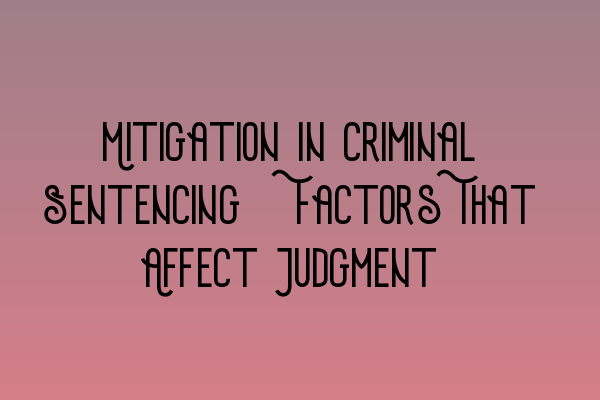Mitigation in Criminal Sentencing: Factors That Affect Judgment
Welcome to the SQE Criminal Law & Practice Law UK blog! In today’s post, we will explore the crucial concept of mitigation in criminal sentencing and the various factors that can influence judgment in court. Understanding these factors is essential for aspiring solicitors preparing for the SQE exam and for legal professionals seeking to excel in their practice.
The Importance of Mitigation in Criminal Sentencing
When a defendant is found guilty of a criminal offense, a crucial stage of the legal process is the determination of the appropriate sentence. Mitigation plays a vital role in influencing the judge’s decision. It involves presenting factors that can reduce the severity of the sentence imposed on the defendant.
Mitigation allows the court to consider various circumstances surrounding the offense and the offender, providing a balanced approach to justice. By exploring mitigating factors, solicitors can advocate for fair and proportionate sentencing that reflects the unique circumstances of each case.
Factors That Can Impact Sentencing
There are numerous factors that can influence how a judge determines the appropriate sentence. It is crucial for solicitors to understand these factors and effectively present them to the court:
- Character references: Positive statements from family, friends, or employers that highlight the defendant’s good character and exemplary behavior can significantly impact the judge’s perception of the defendant.
- Remorse and rehabilitation: Demonstrating genuine remorse and efforts towards rehabilitation can indicate that the defendant has taken responsibility for their actions and is actively working towards personal growth and reform.
- Mental health issues: Presenting evidence of mental health issues, such as depression or anxiety, can help contextualize the defendant’s behavior and highlight the need for appropriate support and treatment rather than strict punishment.
- Cooperation with authorities: If the defendant has cooperated fully with the police or provided substantial assistance in the investigation or prosecution of others, it can demonstrate their willingness to make amends and assist the justice system.
- Young age or vulnerability: For youthful or vulnerable defendants, the court may consider their age, personal circumstances, or influence from others in determining a more lenient sentence that focuses on rehabilitation rather than punishment.
These factors are not exhaustive, and each case will present unique circumstances that require careful consideration. Aspiring solicitors must develop the skills to identify and articulate relevant mitigating factors effectively.
SQE Exam Preparation and Mitigation in Sentencing
For aspiring solicitors preparing for the SQE exam, understanding mitigation in criminal sentencing is crucial. It is a topic that frequently appears in legal scenarios and requires a comprehensive knowledge of the factors that can influence a judge’s decision.
If you are studying for the SQE exam, make sure to check out our article on SQE Exam Prep: Essential Study Materials for Aspiring Solicitors for useful study resources.
Conclusion
Mitigation in criminal sentencing is a complex and multifaceted area of law. It requires solicitors to carefully analyze the unique circumstances of each case and effectively advocate for fair and proportionate sentencing. By understanding the factors that can influence judgment, legal professionals can provide valuable assistance to clients and strive for justice in the criminal justice system.
To learn more about the SQE exam and other essential topics for aspiring solicitors, check out our related articles:
- SQE Exam Prep: Essential Study Materials for Aspiring Solicitors
- Demystifying the Solicitors Qualifying Examination Format
- SQE Exam for International Lawyers: Challenges and Success Strategies
- LLC Formation Made Simple: Step-by-Step Guide for UK Entrepreneurs
- LLC Formation: A Step-by-Step Guide for UK Entrepreneurs
